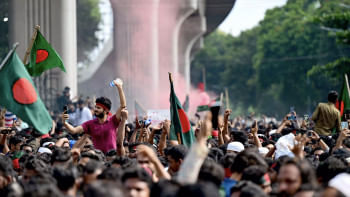Can a proportional representation system ensure better democracy?

In Bangladesh elections, we practise the first-past-the-post (FPTP) system. The candidate receiving the highest number of votes in a constituency wins a seat in parliament. The political party winning the highest number of seats in parliament forms the government alone, or through coalition. If the FPTP system is changed to the proportional representation (PR) system, in full or in part, it may bring about improvement in the existing political system of the country, providing for peaceful elections and more free, fair and credible representation of voters through their elected representatives in parliament.
In the PR system, an election is among registered political parties. There will no longer be 300 constituencies; the whole country will be one single constituency. Each party may declare names of its candidates well ahead of the day of election (three to six months ahead). In the alternative, for convenience's sake, lists of candidates may be closed ones. Except for a few top members, no one in a party will know the names of nominated candidates, until the results are declared.
In the PR system, each party may be required to pay a certain amount of money as security fee against each of its nominated candidates. A party believing that it may win only 100 seats based on proportion should field 100 candidates or a few more, like 130 candidates. That will help the party save security money. A provision may be there that if a party, for instance, fields 100 candidates but gets 120 seats based on proportion, it will be allowed to give 20 new candidates to be declared elected, subject to payment of higher (as penal) security fees against the additional candidates. In the alternative, a provision may be made that those 20 seats shall stand forfeited to be redistributed by a re-election, or that those 20 seats may be distributed to other winning parties according to the ratio of proportion subject to payment of additional security fees. A provision may be made that a party winning less than 10 seats, as against 100 candidates fielded, shall be deregistered for future elections, and the seats won shall be forfeited so as to be distributed among the remaining qualified parties proportionately. Or, if not, the security fees of those 90 candidates not elected shall be forfeited. That may act as a deterrence to help sensitise parties to field a reasonable number of candidates.
For an easier understanding, the matter may be illustrated as follows in the context of Bangladesh's unicameral legislature. If four parties—namely parties A, B, C and D—contest, each nominating 300 candidates from the centre, and after polling and counting it appears that Party A has received 50 percent of the total votes cast, Party B received 30 percent, Party C 10 percent, and Party D 10 percent, then Party A will take 50x3=150 out of 300 seats, Party B will take 30x3=90 seats, Party C will take 10x3=30 seats and Party D will take 10x3=30 seats. Thus, all 300 seats will be occupied. If a party gets only one percent of the votes cast, it will get three seats in parliament. If a party gets only 0.34 percent votes, it will get one seat in parliament. If the ratio of votes received by a party is less than 0.34 percent, that party may or may not get a seat, based upon an arithmetical formula to be made regarding that. If a party gets fewer than 150 seats, it will have to make a coalition to raise its seats to more than 150. This system is working in many countries, and can be further studied by examining how it works in countries practising the PR system.
No by-election will be necessary in case of deaths, etc of a member of parliament. The party concerned will fill in the position of the demised member from the original list as per the order of precedence for the rest of the tenure. Or in the alternative, that party may be allowed to auto-elect a new candidate as the new MP. This way, the proportional representation system may reduce expenses as well as hassles of holding by-elections. Reserved seats for women may be done away with. To ensure adequate representation of women in parliament, each contesting party may be required to declare two lists, i.e. a general list for all and a reserved list for women only. If 10 percent of the seats should be reserved for women, a provision of law may be that any party nominating candidates shall be required to enlist two women candidates among each 10 candidates. In that case, a party proposing 300 candidates shall propose 60 women candidates. Hence, there shall be 60 women MPs among 300 MPs. A separate election to reserved seats for women shall not be necessary then. That also simplifies the overall electoral process.
" layout="left"]If a party does not win more than 50 percent of the seats, and a coalition is, therefore, needed to be made and cannot be made readily within a certain specified time, the largest party may be allowed to make government, and its seats in parliament may be declared deemed (by legal fiction) raised to 151 for the formation of the government and all ordinary voting purposes in the legislature. No right-away stalemate in government or parliament will be created in that case. If a coalition can be made, a coalition government can run for a full term of five years or as long as the coalition endures. If a coalition breaks, and no further coalition is made, a fresh election may be held within 90-120 days of that.
If the PR system is introduced, the provision of contest by independent candidates may be repealed. In the present FPTP system, a genuine, strong candidate may field a few fake or dummy independent candidates in order to obtain polling agents for them and to control polling stations by them. Individual candidates in constituencies may resort to multiple malpractices in order to win at any cost, whether voters support them or not. In the PR system, one cannot do that for more than one seat. Originally, one could contest in all 300 seats by virtue of the constitutional provision. Then by the 1984 amendment of the Representation of the People Order (RPO), 1972, it was made five seats. Then by further amending the RPO in 2008, it was made three seats. There was no rationale for it. In the PR system, there will be no scope of that. Constitutional amendments will be necessary to introduce the PR system. Not many amendments—only a few amendments may do.
Such a system, if introduced, will do away with many prevalent malpractices like muscle and money power, bribing, violence in and around polling stations, ballot snatching, ballot stuffing, rigging, etc. The hassle of maintaining 300 constituencies will no longer be there. Delimitation of constituencies will not be necessary. The hassle of contest by independent candidates will be done away with. The hassle of contest in more than one seat by one candidate may also be done away with. Another major advantage of the system will be that the hassles of nomination submissions locally all over the country will be substantially reduced. Nomination will be submitted centrally in Dhaka, the capital, directly or online. All (100 percent) voters will be represented in parliament. Now a party, receiving only 25 percent of the votes cast, may form government. That never happens in the PR system.
Parliamentary elections may be more transparent, free, fair and credible in the PR system. In the existing FPTP system, incidents of false voting, centre-capturing, ballot-snatching and ballot stuffing, rigging, manipulation, influencing the police, administration and polling officers with money or threats, etc are quite many and random. If the proportional representation system is introduced, such incidents will reduce substantially.
More than a hundred countries in the world practise some form of the PR system in national elections. The demographic homogeneity in Bangladesh may be conducive to the introduction of this system. The pros and cons, merits and demerits of the proportional representation system may be studied in the context of Bangladesh, and if found suitable and introduced, the conduct of elections in Bangladesh may become much easier. Elections will be far less expensive. That may help develop a healthy political culture and a better democracy.
Kazi Habibul Awal is the chief election commissioner of Bangladesh.
Views expressed in this article are the author's own.
Follow The Daily Star Opinion on Facebook for the latest opinions, commentaries and analyses by experts and professionals. To contribute your article or letter to The Daily Star Opinion, see our guidelines for submission.

 For all latest news, follow The Daily Star's Google News channel.
For all latest news, follow The Daily Star's Google News channel. 











Comments